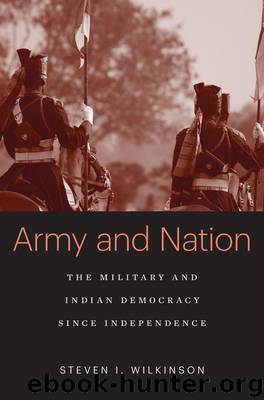Army and Nation: The Military and Indian Democracy since Independence by Steven I. Wilkinson

Author:Steven I. Wilkinson [Wilkinson, Steven I.]
Language: eng
Format: epub
ISBN: 9780674728806
Publisher: Harvard University Press
Published: 2015-02-12T07:00:00+00:00
FIGURE 5.1 Parliamentary questions on state and community recruitment in the army, 1952–2012
Source: Wilkinson data from Lok Sabha and Rajya Sabha proceedings.
Another major challenge has come from the massive economic development and technological change since liberalization in 1991. Despite several major pay increases, army officers are still underpaid relative to many civilian professions. This has a negative influence on the army and its autonomy from society and politics in several ways. First, and most directly, the relatively poor pay of officers compared to their civilian counterparts—especially when combined with the army’s promotion structures, in which huge numbers of officers face being laid off in productive middle age—has led to increasing numbers of good officers trying to leave the army early in their careers. This “officer deficit,” everyone agrees, makes it much harder for the army to maintain discipline and manage the social and unit stresses that inevitably emerge, especially during long domestic deployments. The army’s own experts in combat psychology have emphasized the many problems that can occur in terms of unit cohesion and discipline in the many units that have too few officers and too much turnover among those they do have.9
Corruption in the army is also a problem, as in other areas of life in India. Just how much of a problem is unclear, because as always it is hard to infer the extent of the problem from those cases that are made public, such as the investigation of a Major General in charge of contracts for army rations in Jammu and Kashmir in 2012.10 But the size of the sums involved in the major military procurement projects, combined with the fact that the army—in the midst of India’s real estate boom—owns and controls prime land in most of India’s major cities, has clearly created lots of opportunities. The fact that lower- and middle-ranking officers see the top brass, or at least some of them, enriching themselves through procurement deals and securing allocations for property in ex-officer developments—most notoriously the Adarsh housing development in Mumbai that came to light in 2011—cannot help but gnaw at the sense of solidarity in the armed forces.11
In addition, the spread of mass education, new ideas of rights and citizenship, mass media, and modern cellphone technology have created major challenges to the army’s ability to retain traditional military hierarchies and remain a society apart. In World War II 82 percent of all infantry jawans were illiterate, whereas today virtually all soldiers have been through at least a few years of secondary school.12 The “narrowing” of the social and educational gap between officers and men while the military hierarchies and pay differentials between officers and men have remained constant has led to some obvious strains. The Indian Army’s loyalty to civilian rule over the years has in some ways stemmed from successful efforts to keep it a highly disciplined force apart from society. But in an age of mass literacy, with the now ubiquitous mobile phones making the jawan’s village and all its issues just a moment away, it has been much harder for the army to remain a society apart.
Download
This site does not store any files on its server. We only index and link to content provided by other sites. Please contact the content providers to delete copyright contents if any and email us, we'll remove relevant links or contents immediately.
| Anthropology | Archaeology |
| Philosophy | Politics & Government |
| Social Sciences | Sociology |
| Women's Studies |
The Secret History by Donna Tartt(19066)
The Social Justice Warrior Handbook by Lisa De Pasquale(12190)
Thirteen Reasons Why by Jay Asher(8897)
This Is How You Lose Her by Junot Diaz(6881)
Weapons of Math Destruction by Cathy O'Neil(6270)
Zero to One by Peter Thiel(5792)
Beartown by Fredrik Backman(5744)
The Myth of the Strong Leader by Archie Brown(5505)
The Fire Next Time by James Baldwin(5434)
How Democracies Die by Steven Levitsky & Daniel Ziblatt(5217)
Promise Me, Dad by Joe Biden(5148)
Stone's Rules by Roger Stone(5084)
A Higher Loyalty: Truth, Lies, and Leadership by James Comey(4956)
100 Deadly Skills by Clint Emerson(4922)
Rise and Kill First by Ronen Bergman(4784)
Secrecy World by Jake Bernstein(4746)
The David Icke Guide to the Global Conspiracy (and how to end it) by David Icke(4712)
The Farm by Tom Rob Smith(4504)
The Doomsday Machine by Daniel Ellsberg(4487)
